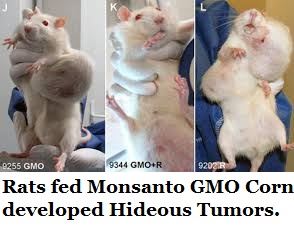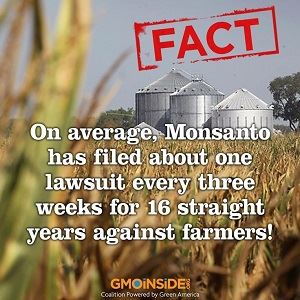 Monsanto’s official position is that no evidence shows Roundup or glyphosate can cause cancer. The problem for Monsanto is that plenty of evidence shows Roundup, as well as its only identified active ingredient, glyphosate, is carcinogenic. A Roundup lymphoma lawsuit petition from April 2016 outlined some history of which Monsanto cannot help but be aware. Roundup carcinogenicity evidence has been clear since at least 1985, if not earlier.
Monsanto’s official position is that no evidence shows Roundup or glyphosate can cause cancer. The problem for Monsanto is that plenty of evidence shows Roundup, as well as its only identified active ingredient, glyphosate, is carcinogenic. A Roundup lymphoma lawsuit petition from April 2016 outlined some history of which Monsanto cannot help but be aware. Roundup carcinogenicity evidence has been clear since at least 1985, if not earlier.Monsanto Knows Glyphosate Carcinogenic
Monsanto knew of glyphosate’s carcinogenic properties as early as the 1980s.
Related: Monsanto Lawsuit
Roundup Carcinogenicity Evidence Clear since 1985
March 4, 1985: A group of the EPA’s Toxicology Branch published a memorandum classifying glyphosate as a Category C oncogene. Category C oncogenes are possible human carcinogens with limited evidence of carcinogenicity.
1986: EPA issued a Registration Standard for glyphosate (NTIS PB87-103214). The Registration standard required additional phytotoxicity, environmental fate, toxicology, product chemistry, and residue chemistry studies. All the data required was submitted and reviewed and/or waived.
October 1991: EPA published a Memorandum entitled “Second Peer Review of Glyphosate.” The memorandum changed glyphosate’s classification to Group E (evidence of non-carcinogenicity for humans). Two peer review committee members did not concur with the committee’s conclusions. One member refused to sign.
Roundup Toxicity Dwarfs Glyophosate Alone
Besides the toxicity of the active molecule in glypohosate, many studies support the hypothesis that glyphosate formulations found in Monsanto’s Roundup products are more dangerous,more toxic than glyphosate alone.
 Since glyphosate is rarely, if ever, used alone, it is irresponsible, at best, for Monsanto to test only glyphosate. It is duplicitous, disingenuous, and quite possibly criminal, at worst, to test only glyphosate alone.
Since glyphosate is rarely, if ever, used alone, it is irresponsible, at best, for Monsanto to test only glyphosate. It is duplicitous, disingenuous, and quite possibly criminal, at worst, to test only glyphosate alone.Related: Roundup Cancer Lawsuit
1991 (or earlier): Evidence had demonstrated glyphosate formulations were significantly more toxic than glyphosate alone.
2002: Julie Marc published a study titled “Pesticide Roundup Provokes Cell Division Dysfunction at the Level of CDK1/Cyclin B Activation.” The Marc study found Monsanto’s Roundup caused delays in the cell cycles of sea urchins, while the same concentrations of glyphosate alone proved ineffective and did not alter cell cycles.
2004: Ms. Marc published a study titled “Glyphosate-based pesticides affect cell cycle regulation.” The study demonstrated a molecular link between glyphosate-based products and cell cycle dysregulation. The study noted: “[C]ell-cycle dysregulation is a hallmark of tumor cells and human cancer. Failure in the cell-cycle checkpoints leads to genomic instability and subsequent
development of cancers from the initial affected cell.” Further, “[s]ince cell cycle disorders such as cancer result from dysfunction of unique cell, it was of interest to evaluate the threshold dose of glyphosate affecting cells.”
2005: Francisco Peixoto published a study showing Roundup’s effects on rat liver mitochondria are much more toxic and harmful than the same concentrations of glyphosate alone.
The Peixoto study suggested the harmful effects of Roundup on mitochondrial bioenergetics could not be exclusively attributed to glyphosate. They could be the result of other chemicals, namely the surfactant POEA, or alternatively due to the possible synergy between glyphosate and Roundup formulation products.
Roundup Adjuvants NOT INERT
2009: Nora Benachour and Gilles-Eric Seralini published a study examining the effects of Roundup and glyphosate on human umbilical, embryonic, and placental cells. The study used dilution levels of Roundup and glyphosate far below agricultural recommendations, corresponding with low levels of residues in food. The study concluded that so-called “inert” ingredients, and possibly POEA, change human cell permeability, amplifying toxicity of glyphosate alone. The study further suggested glyphosate toxicity determinations must take adjuvants into account – the chemicals used in the formulation of the complete pesticide. The study confirmed adjuvants in Roundup are not inert; so Roundup is always more toxic than its so-called lone active ingredient, glyphosate.
Monsanto Knew or Should Have Known
The Delaware petition reads: “The results of these studies were confirmed in recently published peer-reviewed studies and were at all times available and/or known to (Monsanto).
“(Monsanto) knew or should have known that Roundup is more toxic than glyphosate alone and that safety studies on Roundup, Roundup’s adjuvants and “inert” ingredients, and/or the surfactant POEA were necessary to protect Plaintiff from Roundup.”
Monsanto Failed to Test Roundup for Safety
The petition further charges that Monsanto “knew or should have known that tests limited to Roundup’s active ingredient glyphosate were insufficient to prove the safety of Roundup.”
Monsanto is then charged in the petition with failing to appropriately and adequately test Roundup, Roundup’s adjuvants and “inert” ingredients, and/or the surfactant POEA in order to protect the plaintiff from Roundup.
RELATED
- Roundup Cancer Lawsuit
- Monsanto Lawsuit
- Monsanto EPA Ties Cancerous

by Matthews & Associates




